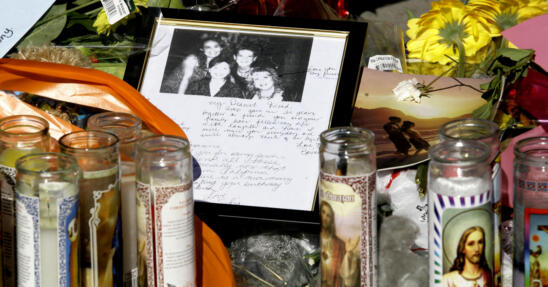The following content contains disturbing accounts of violence. Discretion is advised.
The holiday season kicks off this Thursday, when uncles and cousins and college-student children will travel cross country and gather around tables, where they’ll offer thanks for the thing they appreciate most: their love for one another.
That’s one version, anyway.
For some, though, the holidays can be considerably more grim—like for the families involved in the three Thanksgiving murders we profile below.
[Stream episodes of Killer Cases in the A&E App.]
Although it’s widely believed that rates of domestic violence spike during the holidays, the available research shows that assumption to be limited and inconclusive. However, it may be that when gruesome crimes do occur during the holidays, they get more widespread media coverage since they’re so out of the norm of what we’d expect during such celebratory times.
Sociologist Richard Gelles, an expert on family violence who has written over 20 books on the subject, says there are three primary reasons for holiday violence.
The first, Gelles says, is economic stress, which is more apparent to a struggling family during the holiday season: “What they can’t afford for a Thanksgiving dinner, for Christmas dinner, for gifts.”
Add in the “forced intimacy” of a small-town family holiday—with the stores and restaurants all closed and fraught relatives feeling an obligation to be together all day—and the stress can compound.
The third reason, Gelles argues, is the happiness gap. He says that, “all the TV advertisements, all the TV specials are about how loving and wonderful families are, and how stress-relieving all families are. And of course that is a bit of a myth.”
A myth that was dispelled—for these three families—in the most heartbreaking way.
The Guy Family Thanksgiving: Knoxville, Tennessee, 2016
Twenty-eight-year-old Baton Rouge resident Joel Michael Guy, Jr. traveled from Baton Rouge, Louisiana back home to Knoxville, Tennessee, where he reunited with his three sisters and their parents over turkey and stuffing.
At the end of the evening, the three daughters—who all lived in Tennessee—returned to their homes, Guy Jr. was left alone with his parents: Joel Guy Sr., 61, and Lisa Guy, 55.
That’s when the violence erupted.
At some point between Thursday night and Monday afternoon, the Knox County Sheriff’s department claims Guy Jr. stabbed and dismembered his parents, then attempted to dissolve their bodies in a mix of drain cleaner, sewer cleaner, hydrogen peroxide and bleach.
Guy Jr. was an undergraduate and still dependent on his parents for financial support. Family members told authorities that his parents intended to tell him of their plans to scale back support over the Thanksgiving weekend.
As of March 2017, Guy Jr. is being charged with two counts of first-degree murder, two counts of abusing a corpse and two counts of felony murder. He has no history of mental illness and no prior criminal record.
Gelles says that shame around the money likely played a larger role in the killing than the money itself.
“The conversation had a lot more than, ‘We’re not paying your phone bill,’ ” Gelles says. “I suspect there was a shaming component to it, and that triggered his behavior. If you dig into the psychology of family violence… the more common underlying psychological factor is shame.”
As of the original publication of this article, Guy Jr. remains in jail in lieu of a $2 million-dollar bond. His next court date is November 30, 2017.
[Update: As of November 2018, Guy Jr. is still in jail and his next court date is on December 3, 2018.]
The Mehari-Gebreselassie Family Thanksgiving: Oakland, California, 2006
Talk about trouble with in-laws.
A long-simmering tension between two Eritrean families joined by marriage ended with a triple murder and a sibling pair in prison for first-degree murder.
Asmerom and Tewodros Gebreselassie, 53 and 44, were convicted in the killing of their sister-in-law Winta Mehari, 28, her mother Regbe Bahrengasi, 50, and her brother Yonas Mehari, 17 at the Mehari Thanksgiving.
The brothers were two of 11 siblings who had immigrated to Oakland. They erroneously believed that Winta had killed her husband—their brother—Abraham Gebreselassie earlier in the year, to gain access to his $500,000 life-insurance policy. A pathologist determined that Abraham had died of natural causes.
Tewodros was invited to the Mehari Thanksgiving, from where he contacted Asmerom and opened the door for him into the apartment. He then kidnapped their infant nephew while his brother gunned down the others.
The brothers were found guilty in 2011 and sentenced to life in prison without the possibility of parole. In 2016 Tewodros was released from prison after having his conviction overthrown and his prison sentence revised.
After dinner, they played Christmas songs around an old upright piano. Then came the carnage.
“I’ve been waiting 20 years to do this,” 35-year-old Paul Merhige was heard muttering as he gunned down four and injured two others at a cousin’s family home in Jupiter, Florida.
Among the dead: his 76-year-old aunt, Raymonde Joseph; his 33-year-old twin sisters Carla Merhige and Lisa Knight, who was pregnant; and 6-year-old Makayla Sitton, the daughter of his cousin, who was shot three times from her bed.
Paul’s presence at the dinner had been a surprise. He’d been estranged from his family for years, and at one point one of his sisters put a restraining order against him. But, after purchasing more than $2,000 worth of guns and ammunition in the weeks before the holiday, he called his parents and asked to come to Thanksgiving..
“I hope he doesn’t come and kill us all tonight,” his mother Carole had told his sister Lisa Knight as they were preparing for dinner.
“It came to my mind,” replied the daughter. “But don’t say that to Dad.”
In 2011 Paul Merhige pleaded guilty to all the murders and received a sentence of seven life terms. He avoided the death penalty with his plea deal.
Gelles says Merhige likely suffered from borderline-personality disorder, and that estranged family members who return to kill often do so after failing to move on independently.
“The betting line… is there’s been a series of stressful events that led him to be estranged from his family. And if he came back with the intent of killing, it’s because of his inability to self-soothe these grievances. Borderlines cannot self-soothe when their self-esteem has been attacked.”
But for those left unsettled by the seemingly arbitrary nature of family killings, Gelles says they’re not entirely random: Social isolation, low socio-economic status and youth all correlate with family violence.
“Either because life circumstances have changed, or the consequences do… but people tend to mature out of their violent behavior,” Gelles says.
For those eating Thanksgiving with older relatives, there’s one more thing to be thankful for this year.
Related Features:
How Diane and Rachel Staudte Killed Their Family With Antifreeze
Guns, Knives, Hands: Why Killers Choose Specific Murder Methods
Did ‘Killer Sally’ Sally McNeil Murder Her Bodybuilder Husband In Self-Defense?


